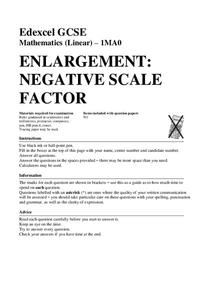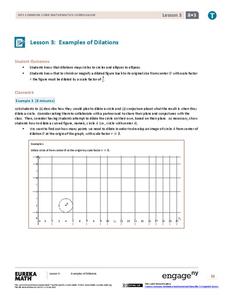Mathed Up!
Negative Scale Factor
Class members investigate the effect of a negative scale factor dilation on coordinate shapes as they watch a short video that shows an example of a geometric figure undergoing a dilation with a negative scale factor. Learners then try a...
Mathed Up!
Similar Shapes
Similar shapes are all about the scale. Given seven problems, pupils use scale factors to determine measurements within similar shapes. While solving the problem, scholars also determine whether two figures are similar and use...
Mathed Up!
Enlargements
Make enlargements with and without centers. Pupils work through seven problems dealing with dilations or enlargements. The first couple items are strict enlargements without centers, while the others have centers. Class members also...
EngageNY
Examples of Dilations
Does it matter how many points to dilate? The resource presents problems of dilating curved figures. Class members find out that not only do they need to dilate several points but the points need to be distributed about the entire curve...
Noyce Foundation
Which is Bigger?
To take the longest path, go around—or was that go over? Class members measure scale drawings of a cylindrical vase to find the height and diameter. They calculate the actual height and circumference and determine which is larger.
Mathed Up!
Mixed Transformations
Viewers learn how to identify and perform a variety of transformations with a video that provides seven items on transformations. Pupils demonstrate their understanding of dilations, reflections, rotations, and translations. The video...
Mathed Up!
Congruent Shapes
Are congruent shapes compatible? Congruent shapes are identical to one another, and throughout the assessment, young mathematicians identify given shapes as congruent.






